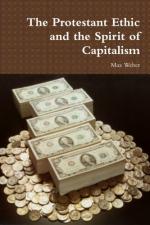
|
| Name: _________________________ | Period: ___________________ |
This test consists of 15 multiple choice questions and 5 short answer questions.
Multiple Choice Questions
1. Who had great influence on Luther?
(a) His father.
(b) The Pope.
(c) A great mystic.
(d) The Saints.
2. What does Cor. ii say would cause detriment to others at our blame?
(a) Altered traditions.
(b) Charity.
(c) Means beyond the essential.
(d) Political changes.
3. Where did Protestant religious dogma leave its marks?
(a) Culture.
(b) History.
(c) Laws.
(d) Economics.
4. How did Pascal describe worldly duties?
(a) Grave.
(b) Important.
(c) Vulgar.
(d) Unnecessary.
5. What religion focused on Predestination?
(a) Calvinism.
(b) Mormonism.
(c) Luthern.
(d) Pietism.
6. What practices of Protestant sects are important to study for the sake of Capitalism?
(a) Economic.
(b) Spiritual.
(c) Personal.
(d) Moral.
7. What were most traditionalists waiting for in their lives?
(a) A new King.
(b) The second coming.
(c) The next world.
(d) The Reformation.
8. Who did Calvin say men existed for?
(a) Their children.
(b) God.
(c) Each other.
(d) Themselves.
9. What did Cromwell say happened when the peasants were hurt?
(a) The king lost power.
(b) They turned away from religion.
(c) The entire commonwealth suffered.
(d) Their loyalty was shaken.
10. Why did Traditionalists work so hard?
(a) So they would set good examples.
(b) So they could be comfortable.
(c) So God would be proud.
(d) So they wouldn't be a burden.
11. Who did Luther think gave him his calling?
(a) The Pope.
(b) God.
(c) Himself.
(d) Jesus.
12. How did Luther's ideas about predestination change over time?
(a) They changed back and forth,
(b) They got stronger.
(c) They faded.
(d) They stayed the same.
13. How did Calvin think men could change the will of God?
(a) None of these.
(b) Through prayer.
(c) Through repentance.
(d) Through good deeds.
14. What religion allowed for monastic life?
(a) Catholic.
(b) Protestant.
(c) Calvinism.
(d) Lutheran.
15. What happened to the ideals of Calvinism and Baptism in the end of the 17th century?
(a) They stayed the same.
(b) They grew apart.
(c) None of these.
(d) They grew closer.
Short Answer Questions
1. What decade was the Reformation in when the idea of the Beruf came out?
2. Who brought the idea of Beruf to Protestants?
3. How do Christians think grace is earned?
4. Which of these is NOT a form of Protestantism?
5. What religion did Pietism become part of?
|
This section contains 347 words (approx. 2 pages at 300 words per page) |

|




